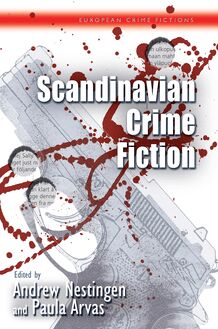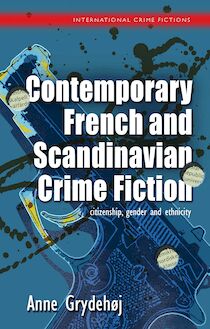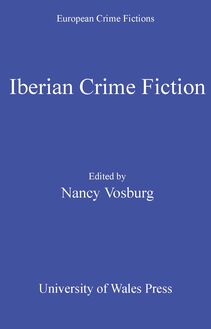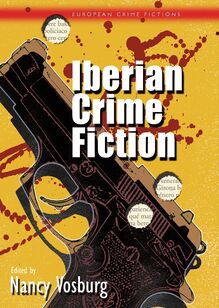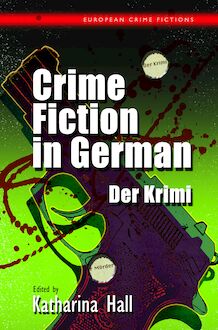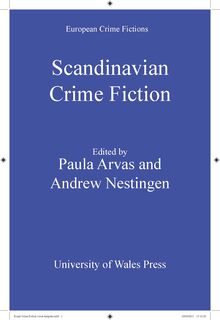Crime Fiction in the City , livre ebook
102
pages
English
Ebooks
2013
Vous pourrez modifier la taille du texte de cet ouvrage
Obtenez un accès à la bibliothèque pour le consulter en ligne En savoir plus
Découvre YouScribe en t'inscrivant gratuitement
Découvre YouScribe en t'inscrivant gratuitement
102
pages
English
Ebooks
2013
Vous pourrez modifier la taille du texte de cet ouvrage
Obtenez un accès à la bibliothèque pour le consulter en ligne En savoir plus
Publié par
Date de parution
30 avril 2013
Nombre de lectures
5
EAN13
9781783160372
Langue
English
Introduction Lucy Andrew and Catherine Phelps 1 Edinburgh Ian Rankin 2 'The map that engenders the territory'? Rethinking Ian Rankin's Edinburgh Gill Plain 3 Corralling Crime in Cardiff's Tiger Bay Catherine Phelps 4 Crimes and Contradictions: the Fictional City of Dublin Cormac O Cuilleanain 5 From National Authority to Urban Underbelly: Negotiations of Power in Stockholm Crime Fiction Kerstin Bergman 6 Streets and Squares, Quartiers and Arrondissements: Paris Crime Scenes and the Poetics of Contestation in the Novels of Jean-Francois Vilar Margaret Atack 7 The Mysteries of the Vatican: From Nineteenth-Century Anti-Clerical Propaganda to Dan Brown's Religious Thrillers Maurizio Ascari 8 A Tale of Three Cities: Megalopolitan Mysteries of the Eighteen-Forties Stephen Knight Conclusion Lucy Andrew and Catherine Phelps
Publié par
Date de parution
30 avril 2013
Nombre de lectures
5
EAN13
9781783160372
Langue
English
CRIME FICTION IN THE CITY
Series Editors Claire Gorrara (Cardiff University) Shelley Godsland (University of Birmingham) Giuliana Pieri (Royal Holloway, London)
Editorial Board Margaret Atack (University of Leeds) George Demko (Dartmouth College) John Foot (University College London) Stephen Knight (University of Melbourne) Nickianne Moody (Liverpool John Moores University) Elfriede Müller (Berlin) Anne White (University of Bradford)
© The Contributors, 2013
All rights reserved. No part of this book may be reproduced in any material form (including photocopying or storing it in any medium by electronic means and whether or not transiently or incidentally to some other use of this publication) without the written permission of the copyright owner except in accordance with the provisions of the Copyright, Designs and Patents Act. Applications for the copyright owner’s written permission to reproduce any part of this publication should be addressed to the University of Wales Press, 10 Columbus Walk, Brigantine Place, Cardiff, CF10 4UP.
www.uwp.co.uk
British Library Cataloguing-in-Publication Data A catalogue record for this book is available from the British Library.
ISBN 978-0-7083-2586-5 e-ISBN 978-1-78316-037-2
The right of the Contributors to be identified as authors of their contributions has been asserted by them in accordance with sections 77 and 79 of the Copyright, Designs and Patents Act 1988.
Typeset in Wales by Eira Fenn Gaunt, Cardiff Printed in Great Britain by CPI Antony Rowe, Chippenham, Wiltshire
Contents
Acknowledgements
Notes on Contributors
1 Introduction
Lucy Andrew and Catherine Phelps
2 Edinburgh
Ian Rankin
3 ‘The map that engenders the territory’? Rethinking Ian Rankin’s Edinburgh
Gill Plain
4 Corralling Crime in Cardiff’s Tiger Bay
Catherine Phelps
5 Crimes and Contradictions: the Fictional City of Dublin
Cormac Ó Cuilleanáin
6 From National Authority to Urban Underbelly: Negotiations of Power in Stockholm Crime Fiction
Kerstin Bergman
7 Streets and Squares, Quartiers and Arrondissements : Paris Crime Scenes and the Poetics of Contestation in the Novels of Jean-François Vilar
Margaret Atack
8 The Mysteries of the Vatican: from Nineteenth-century Anti-clerical Propaganda to Dan Brown’s Religious Thrillers
Maurizio Ascari
9 A Tale of Three Cities: Megalopolitan Mysteries of the 1840s
Stephen Knight
Conclusion
Lucy Andrew and Catherine Phelps
Acknowledgements
This collection had its origins in the 2009 Crime Narratives in Context Colloquium at Cardiff University, entitled ‘Capital crimes: reading and writing crime and cities’, supported by The British Academy. We would like to thank Dr Heather Worthington and Professor Claire Gorrara for offering us invaluable advice and endless support throughout the process of editing this collection. Special thanks also go to Sarah Lewis, commissioning editor of University of Wales Press, for her constant guidance with, and commitment to, this project.
‘Edinburgh’ from Rebus’s Scotland by Ian Rankin © John Rebus Limited 2005 Reproduced by kind permission of the author and The Orion Publishing Group Ltd.
Quotations from the novels of Ian Rankin by kind permission of the Orion Publishing Group Ltd.
Quotations from ‘Dublin Made Me’ by Donagh MacDonagh are included by kind permission of Barbara Cashin and Niall MacDonagh.
Quotations from Angels and Demons and The Da Vinci Code by Dan Brown published by Corgi Books, reprinted by permission of The Random House Group Limited. Reprinted with the permission of Atria, a division of Simon Schuster, Inc., from Angels and Demons by Dan Brown. Copyright © 2000 by Dan Brown. All rights reserved.
Notes on Contributors
Lucy Andrew is a Ph.D. student and postgraduate tutor at Cardiff University where she is researching the origins of juvenile detective fiction in Britain. Her research interests include crime fiction for both children and adults, and children’s popular fiction in Britain and America from the Victorian period to the present day. Her publications are ‘“Away with dark shadders!” Juvenile detection versus juvenile crime in The Boy Detective; or, The Crimes of London. A Romance of Modern Times ’, Clues: A Journal of Detection , 30/1 (spring 2012), 18–29, and six entries for the forthcoming publication 100 British Crime Writers .
Maurizio Ascari is Reader in English literature at the University of Bologna. His main areas of interest are late nineteenth-century British and American literature, eighteenth- and nineteenth-century crime fiction, the Grand Tour and the issues concerning the formation and ‘deconstruction’ of the literary canon. His publications include In the Palatial Chamber of the Mind: Comparative Essays on Henry James (Pescara, Italy: Edizioni Tracce, 1997), A Counter-history of Crime Fiction: Supernatural, Gothic, Sensational (Basingstoke: Palgrave Macmillan, 2007) and Two Centuries of Detective Fiction: A New Comparative Approach (editor; Bologna: COTEPRA, 2000).
Margaret Atack is Professor of French at the University of Leeds. Her research lies primarily in the areas of the literature, thought, film and culture of France in the twentieth century, and particularly the Occupation and Second World War in French fiction and film, women’s writing, crime fiction and May 68. Her publications on crime fiction include Crime and Punishment: Narratives of Order and Disorder , special issue (editor), French Cultural Studies , 12/3 (October 2001). She is currently working on publications from the major AHRC-funded project: ‘Narratives of the Second World War in France 1939 to the present’, including War and Occupation 1940–1944: Other Stories, Stories of Otherness , special issue (editor), French Cultural Studies (August 2011), Framing Narratives of the Second World War in France: New Readings (co-edited with Christopher Lloyd) (2012), and Literature and the Second World War: Remapping the Landscape (with Christopher Lloyd, in preparation).
Kerstin Bergman is Senior Research Fellow in comparative literature at Lund University, specializing in contemporary Swedish and international crime fiction, and is currently working on a research project on the function of science in crime fiction today. Among her recent publications are Kriminallitteratur: Utveckling, genrer, perspektiv (Crime fiction: history, genres, perspectives; Lund: Studentlitteratur, 2011, with S. Kärrholm), ‘Paradoxes of understanding the other: Mankell explores the “African darkness’”, Scandinavian Studies , 82/3 (2010), 337–54, ‘The well-adjusted cops of the new millennium: neo-Romantic tendencies in the Swedish police procedural’, in Andrew Nestingen and Paula Arvas (eds), Scandinavian Crime Fiction (Cardiff: University of Wales Press, 2011), pp. 34–45, and ‘Fictional death and scientific truth: the truth-value of science in contemporary forensic crime fiction’, Clues: A Journal of Detection , 30/1 (spring 2012), 88–98.
Stephen Knight is Professor of English literature at the University of Melbourne. His main research interests are crime fiction, medieval cultural studies and Welsh fiction in English. He has published widely on crime fiction, notably Form and Ideology in Crime Fiction (London: Macmillan, 1980), Continent of Mystery: A Thematic History of Australian Crime Fiction (Melbourne: Melbourne University Publishing, 1997), Crime Fiction 1800–2000 (London: Macmillan, 2003) and The Mysteries of the Cities: Urban Crime Fiction in the Nineteenth Century (Jefferson, NC: Macfarland, 2012). He has also written widely on Welsh fiction in English, including A Hundred Years of Fiction: Writing Wales in English (Cardiff: University of Wales Press, 2004). In 2001 he was awarded the Ned Kelly Lifetime Achievement Award for services to Australian crime fiction.
Cormac Ó Cuilleanáin is Professor of Italian at Trinity College Dublin. His research interests include translation studies, Dante and Boccaccio studies, and creative writing. His publications include ‘Christ stopped at Eboli: fortunes of an American translation’, in Joseph Farrell (ed.), The Voices of Carlo Levi (Oxford, Bern, New York: Peter Lang, 2007), pp. 175–208, Patterns in Dante: Nine Literary Essays (co-editor; Dublin: Four Courts Press, 2005) and Translation and Censorship: Patterns of Communication and Interference (co-editor; Dublin: Four Courts Press, 2009). As Cormac Millar, he is the author of two crime novels published by Penguin, and is currently working on a third.
Catherine Phelps is a Ph.D. student and postgraduate tutor at Cardiff University where she is currently researching Welsh crime fiction written in English. Her research interests are crime fiction, postcolonialism and Welsh writing in English. Her publications are ‘Re-shaping crime fiction in Alison Taylor’s Simeon’s Bride ’, Assuming Gender , 1/1 (2010), ‘Minstrelsy in Malcolm Pryce’s Aberystwyth Mon Amour ’, in Almanac: Yearbook of Welsh Writing in English (Cardigan: Parthian Books, 2011), pp. 47–69, and five entries for the forthcoming publication 100 British Crime Writers .
Gill Plain is Professor of English literature and popular culture at the University of St Andrews, where she is director of the MLitt in women, writing and gender. Her research interests are twentieth-century war writing, crime fiction, theories of gender and sexuality and popular British cinema. Her published work includes Twentieth-century Crime Fiction: Gender, Sexuality and the Body (Edinburgh: Edinburgh University Press, 2001), Ian Rankin’s Black and Blue: A Reader’s Guide (New York and London: Continuum, 2002) and John Mills and British Cinema: Masculinity, Identity and Nation (Edinburgh: Edinburgh University Press, 2006). She is currently working on a literary history of the 1940s.
Ian Rankin is the author of over thirty crime novels to date, notably the Inspector Rebus series. His many awards include the British Book Awards Crim
